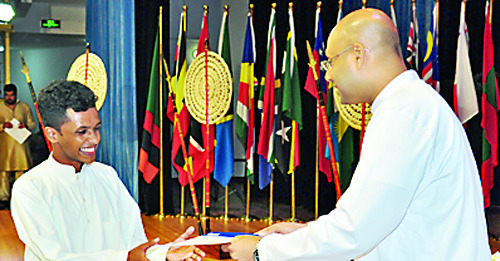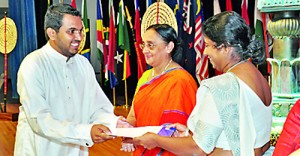Sunday Times 2
BCIS celebrates the ‘Acquisition of Knowledge’
View(s):In Western culture, a graduation ceremony marks the end of an academic programme in which the student officially ends his/her relationship with the institute and teachers. The East has a far deeper meaning attached to this ceremony, where it is the knowledge attained and the relationship between student and teacher that is celebrated. The latter is what the Bandaranaike Centre for International Studies celebrated on September 5 when they held their convocation for 2014 entitled ‘Celebration of the Acquisition of Knowledge’ at the BMICH.
Over 500 students graduating from the institution’s international relations and language departments attended the ceremony. Many were in national attire at the institution’s request. While the institution had formerly followed a graduation ceremony for its diploma students keeping to practices akin to a university graduation, this year it decided to mark a change by requesting students to attend in national dress. Some students were initially dismayed for Sri Lankans traditionally associate academia with a cloak-but many had come around to the idea closer to the event. “We spoke to each student who had doubts and tried to compromise,” explained Chairman Sunimal Fernando. “Most of them understood what we were trying to do, and it made the event much more meaningful.”

Graduating students in national dress receiving their diplomas
The ceremony began with a colourful song and dance item celebrating the country’s cultural diversity. A ‘Tower of Knowledge’ was unveiled, drawing influence from the pillars of Asoka and traditional Asian art. Speaking at the event, Chairperson of the University Grants Commission Professor Kshanika Hirimburegama commended the initiative and hoped that national universities would soon embody the practice within their own ceremonies. Chief Justice Mohan Peiris and External Affairs Minister Professor G.L. Peiris also voiced similar sentiments, underscoring the importance of institutional arrangements that educated students about their world whilst preserving their own identity. Identity, especially cultural, was vital for a diplomat, they pointed out.
“The convocation was a novel experience,” says Tharindu Jayawardhane, a student who followed a Higher Diploma course in International Relations, graduating with his batch’s Best Student award. “It was really interesting to witness the use of language and artistic performances to

Graduating students in national dress receiving their diplomas
reflect the cultural diversity of both the nation and the institute. I believe it was a timely experiment to rediscover the Sri Lankan identity in education.”
A felicitation ceremony for the institution’s teaching staff was also part of the event, with students presenting tokens of appreciation to each faculty member. In the celebration of this student-teacher relationship the institution hoped to emphasise the cultural values historically attached to such a relationship, said Mr. Fernando. Perhaps it may sound ambitious, transitioning from a decades-old format that local institutions have adopted as their own-”it will certainly take time,” says Mr. Fernando. “But someone must take the first step. We will keep doing this, and our students and their parents will take on the message to others.”

